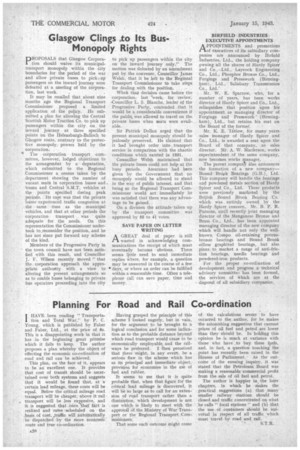Glasgow Clings to Its Bus Monopoly Rights
Page 22

If you've noticed an error in this article please click here to report it so we can fix it.
PROPOSALS that Glasgow Corporation should waive its municipaltransport monopoly within the city boundaries for the period of the war and allow private buses to pick -up passengers on the inward journey were defeated at a meeting of the corporation, last week.
It may be recalled that about nine months ago the Regional Transport Commissioner proposed a limited application of the policy. He sub mitted a plan for allowing the Central Scottish Motor Traction Co. to pick up passengers within the city on the inward journey at three specified points on the Helenshurgh-Balloch to • Glasgow route, contrary to the 'protective monopoly, powers held by the Corporation.
6 The cOrporation transport committee, however, lodged objections to
• the arrangement by a deputation, which submitted to the Regional Commissioner a census taken by the department showing the number of vacant seats in corporation buses and.
• trams and Central S.M.T. vehicles at the points specified during peak periods. Its case was that the private buses experienced traffic congestion at the same time as the municipal vehicles, and that at other periods the corporation transport was quite adequate for the needs. On this representation the Commissioner undertook to,reconsider the position, and he has not since put forward any scheme of the kind.
Members of the Progressive Party in the town council have not been satisfied with this result, and Councillor J. F. Wilson recently moved "that the corporation approach the appropriateauthority with a view to altering the present arrangements so as to enable buses belonging to private bus operators proceeding into the city to pick up passengers within the city on the inward journey only." The motion was defeated by an amendment put by the convener, Councillor'James Welsh, that it be left to the Regional Transport Commissioner to take steps for dealing with the position.
When that decision came before the corporation, last 'week, for review; -Councillor L. S. Blanche, leader of the Progressive Party, contended that it would be a considerable convenience if the public, was allowed to travel on the private buses when seats were available.
Sir Patrick Dollen arged that the present municipal monopoly should be jealously preserved. He claimed that it had brought order into , transport service in comparison with the chaotic conditions which existed in 1981.
Councillor Welsh maintained that the private buses could not help at the busy periods. Assurance had been given by the Goverament that no monopoly would be allowed to stand in the way of public interest, and that being so the Regional Transport Commissioner would act immediately he was satisfied that there was any advantage to be gained.
On a division the attitude-taken up by the transport. committee was approved by 58 to 41 votes.
SAVE PAPER ON LETTER WRITING
AGREAT deal of paper is still wasted in acknowledging communications the receipt of which must eventually become obvious. There seems little need to send immediate replies where, for example, a question may be answered in the course of a few
• days, or where an order can be fulfilled within a-reasonable time. Often a telephone call can save paper, time and money.




















































